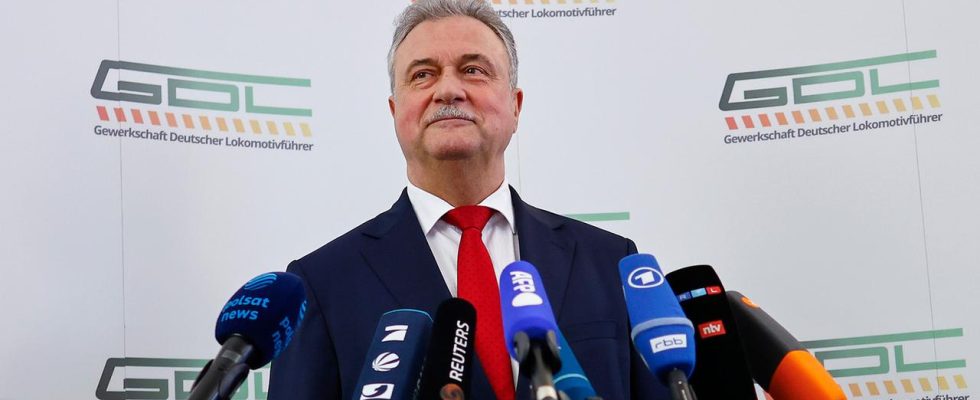GDL boss Weselsky is heavily criticized because he misrepresented a mediator’s proposal in the collective bargaining dispute – and still wants to go on strike. The passenger association is calling for the strike to be called off. Transport Minister Wissing also finds clear words.
The train drivers’ strike, now the fifth in the current round of collective bargaining at the railway, is increasingly attracting criticism. In an interview with the ARD capital studio Federal Transport Minister Volker Wissing explained that the conflict was becoming increasingly incomprehensible. He particularly criticized the attitude of the train drivers’ union GDL, which was not interested in a solution: “Anyone who makes use of the right to strike must also take responsibility and that means negotiating constructively. This gives the impression that reasons for striking are being sought instead of solutions in a collective bargaining dispute.”
Lack of understanding about Weselsky’s “mistake in thinking”
Wissing’s main cause of incomprehension is that GDL boss Claus Weselsky spread false representations of an interim status in the railway collective bargaining negotiations. Weselsky justified this with a “misconception”. Minister Wissing said: “I don’t find it understandable why Mr. Weselsky misunderstood the conciliation paper. Because the conciliation paper is not worded in an ambiguous way. And I have to demand that negotiations here take place professionally and responsibly,” said the FDP politician .
The minister also clearly criticized the union’s new strategy of carrying out so-called wave strikes, which are no longer announced: “I have no understanding when Mr. Weselsky says that he is working to ensure that the train is not a reliable means of transport. That can happen “It is not meant seriously and that is why a solution must now be found seriously and professionally on the basis of the arbitrator’s proposal. And without causing further strikes.”
“Weselsky should call off the strike”
Not only Wissing, but also associations and other experts criticized the GDL’s actions. The President of the Federal Association of Local Rail Transport, Thomas Prechtl, expressed his understanding that misinterpretations could occur after numerous rounds. At the same time, however, he declared that it should not happen “that millions of passengers will not be able to come to work again from Thursday because of such a ‘mistake in thinking’, because trains will not be running due to the strike.”
The Pro Bahn passenger association made a similar statement: “Weselsky should call off the strike,” says its chairman, Detlef Neuß, to the Süddeutsche Zeitung. The chairman of the Bundestag Transport Committee, Udo Schiefner, called on the GDL to return to the negotiating table. “My appeal is very simple: the right to strike is one thing, a sense of responsibility is another,” the SPD politician told the Bild newspaper.
Compromise proposal close to GDL requirement
The background is an agreement proposal from the two moderators – the former Interior Minister Thomas de Maizière and the Schleswig-Holstein Prime Minister Daniel Günther – which came very close to the union’s demands. Accordingly, the compromise envisaged reducing the weekly working hours for train crews in shift work and employees in workshops in two stages from the current 38 to 36 hours with full wage compensation. The first hour should be eliminated on January 1, 2026, the second on January 1, 2028. The GDL is calling for a reduction to 35 hours.
Weselsky presented the moderators’ suggestion differently at a press conference on Monday: They would have suggested a reduction to just 37 hours with full wage compensation. A further half hour reduction would have been purely optional and associated with financial losses for the employees. The railway immediately rejected this representation. Weselsky admitted to the Süddeutsche Zeitung on Tuesday that he had made a “mistake in thinking” with this false representation. But that doesn’t change his rejection of the proposal, he emphasized. Because this does not contain any step towards a 35-hour week, the GDL’s initial requirement.
Strike until Friday afternoon
Regardless of the debate, the train drivers’ fifth strike began at 6 p.m. that evening. Initially only freight traffic will be affected, but from Thursday morning passenger traffic will also be affected. The trains should be largely at a standstill until Friday afternoon at 1 p.m.
As railway spokesman Achim Stauß explained, the railway wants to maintain a basic range of connections again. This applies to long-distance, regional and S-Bahn transport. Stauß did not say exactly how many trains would run. There are also regional differences. However, longer trains should be used in long-distance transport so that more passengers can use the few connections. He called on passengers to find out in good time which connections actually run. A rebooking is possible for every passenger without any problems, he emphasized.
Nevertheless, the strike will again have massive effects. This applies not only to passenger transport, but also to the economy. Stauß gave the example of the automotive or chemical industries, which cannot be supplied with raw materials or parts.

